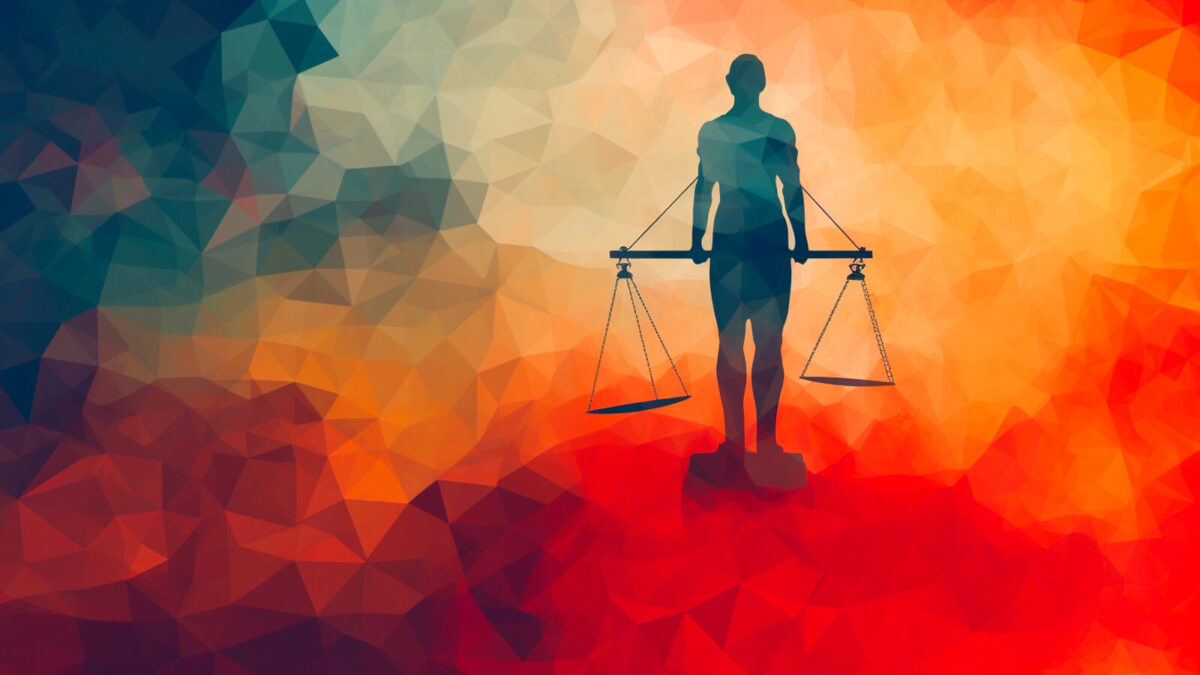In a world often quick to judge, it’s time to redefine our approach. This article advocates for a shift from assessing individuals to understanding incidents, promoting empathy, growth, and accountability. By considering context, embracing compassion, and recognizing the potential for change, we pave the way for a more just and compassionate society. Cultivating understanding requires personal reflection, but it leads to profound growth and fosters a culture of empathy. Let’s move beyond labels and biases, towards a world where judgment is centered on incidents, not individuals, fostering connection, growth, and transformation.

The Power of Perspective: Shifting from Judging Individuals to Assessing Incidents
In a world brimming with complexity and nuance, our instinct to judge often leads us down a path of misunderstanding and division. From social media spats to courtroom dramas, the act of passing judgment is ingrained in our daily lives. Yet, what if we were to pause and reconsider our approach? What if, instead of hastily labeling individuals, we chose to focus on the incidents themselves?
Here are some examples of judging incidents rather than the person:
Traffic Incident: Instead of immediately judging a driver who cuts you off in traffic as a reckless or inconsiderate person, consider the possibility that they may be rushing to the hospital or dealing with an emergency. By understanding the context of the incident, you can empathize with their situation rather than condemning their behavior.
Workplace Conflict: If a colleague makes a mistake or acts in a way that disrupts the workplace, rather than labeling them as incompetent or difficult, consider the circumstances that may have led to their actions. Perhaps they were under a lot of pressure or dealing with personal challenges outside of work. By separating the person from the incident, you can approach the situation with empathy and seek to resolve the conflict constructively.
Social Media Misunderstanding: In the age of social media, misunderstandings and conflicts can arise quickly. Instead of jumping to conclusions about someone’s character based on a single comment or post, take the time to consider the context and intent behind their words. By judging the incident rather than the person, you can avoid escalating tensions and promote more meaningful dialogue.
Family Disagreement: When tensions run high during family disagreements, it’s easy to assign blame and point fingers. However, by focusing on the specific incident at hand rather than the individuals involved, you can approach the situation more objectively. This allows for a more constructive conversation where each person’s perspective is heard and respected.
Legal Dispute: In legal proceedings, it’s essential to focus on the facts of the case rather than making assumptions about the character of the individuals involved. By evaluating the incident based on evidence and testimony, judges and jurors can make fair and impartial decisions that uphold justice.
In each of these examples, judging the incident rather than the person allows for greater understanding, empathy, and resolution.
Overview of the Article’s Focus on Empathy, Growth, and Accountability
This article seeks to explore the transformative power of shifting our perspective from individuals to incidents. It delves into the realms of empathy, growth, and accountability, offering insights and practical guidance for navigating this paradigm shift. By examining real-life anecdotes and thought-provoking tips, readers will gain a deeper understanding of how embracing this mindset can foster personal and societal change.
Guidance and Usage
To effectively implement this shift in perspective, it’s essential to understand its underlying principles and practical applications. Throughout this article, readers will find guidance on how to cultivate empathy, promote growth, and uphold accountability in their daily lives. From reflective exercises to actionable tips, each section provides valuable insights and strategies for embracing this new approach to judgment.
Understanding the Context: Exploring the Depths of Human Behavior
A. Exploring the Complexities of Human Behavior and the Influence of Context
Human behavior is a multifaceted tapestry woven from a myriad of influences, including upbringing, culture, and personal experiences. Each individual is a product of their environment, shaped by the circumstances they encounter and the choices they make. By delving into the complexities of human behavior, we gain a deeper appreciation for the intricacies that underlie every action and decision.
Consider, for example, the case of a seemingly aggressive driver cutting off others in traffic. At first glance, it’s easy to pass judgment and label them as rude or inconsiderate. However, upon closer examination, we may discover that they are rushing to the hospital to be with a loved one in need. In this scenario, understanding the context behind their behavior allows us to empathize rather than condemn.
B. The Limitations of Snap Judgments and the Importance of Considering the Broader Picture
Snap judgments, while instinctual, are often riddled with biases and assumptions that cloud our understanding. When we hastily label someone based on a single incident, we overlook the intricate web of factors at play. This narrow perspective limits our ability to see the bigger picture and hinders our capacity for empathy and compassion.
By taking the time to consider the broader context surrounding an incident, we open ourselves up to a wealth of insights and understanding. We begin to see individuals not as static beings defined by their actions, but as dynamic beings shaped by a multitude of influences. This shift in perspective allows for more nuanced judgments and fosters a greater sense of empathy and connection with others.

Empathy and Compassion: Building Bridges of Understanding
A. The Role of Empathy in Fostering Connection and Understanding
Empathy serves as the cornerstone of human connection, allowing us to bridge the gap between ourselves and others. It is the ability to understand and share the feelings of another, to walk in their shoes and see the world through their eyes. By cultivating empathy, we open ourselves up to a deeper level of understanding and forge meaningful connections with those around us.
When we approach a situation with empathy, we are better equipped to recognize the emotions underlying someone’s actions. We become attuned to their needs, fears, and aspirations, fostering a sense of camaraderie and solidarity. Whether it’s offering a listening ear to a friend in distress or extending a helping hand to a stranger in need, empathy enables us to reach out and support one another in times of joy and sorrow.
B. Practicing Compassion by Separating the Person from the Incident
Compassion lies at the heart of empathy, guiding us to respond with kindness and understanding even in the face of adversity. It involves recognizing the humanity in others and extending grace and forgiveness, regardless of their actions. One powerful way to practice compassion is by separating the person from the incident, acknowledging that their worth extends beyond their mistakes.
When we refrain from conflating a person’s identity with their behavior, we create space for healing and growth. Instead of condemning them outright, we choose to see them as individuals with the capacity for change and redemption. This doesn’t mean excusing harmful behavior or turning a blind eye to injustice; rather, it involves holding individuals accountable while still offering them the opportunity for forgiveness and transformation.
In the following sections, we will explore practical strategies for cultivating empathy and compassion in our daily lives. Drawing from real-life anecdotes and expert insights, we will uncover the transformative power of these virtues in building a more empathetic and compassionate world.
Recognizing Growth and Change: Embracing Personal Evolution
A. Embracing the Concept of Personal Evolution and Transformation
Human beings are inherently dynamic creatures, capable of undergoing profound transformations throughout their lives. Embracing the concept of personal evolution means acknowledging that change is not only possible but inevitable. It involves recognizing that our experiences, choices, and interactions shape who we are and who we can become.
When we adopt a mindset of growth and transformation, we free ourselves from the constraints of past mistakes and limitations. We embrace the opportunity to learn, adapt, and evolve, continually striving to become the best versions of ourselves. This journey of self-discovery is marked by moments of triumph and tribulation, each contributing to our growth and development.
B. Examples of Individuals Who Have Demonstrated Growth Over Time
History is replete with stories of individuals who have overcome adversity and emerged stronger and wiser. From political leaders to cultural icons, these individuals serve as beacons of hope and inspiration, reminding us of the power of resilience and perseverance.
Consider the example of Nelson Mandela, who spent 27 years in prison fighting against apartheid in South Africa. Despite enduring unimaginable hardship, Mandela emerged from captivity with an unwavering commitment to reconciliation and forgiveness. His journey from prisoner to president is a testament to the transformative power of forgiveness and the human capacity for growth.
Similarly, Oprah Winfrey’s story is one of triumph over adversity. Born into poverty and facing numerous obstacles throughout her life, Winfrey defied the odds to become one of the most influential figures in media and philanthropy. Her journey is a testament to the power of resilience, determination, and self-belief in overcoming adversity and achieving personal growth.
In the next section, we will explore practical strategies for fostering personal growth and embracing change in our own lives. Drawing from the wisdom of these exemplary individuals, we will uncover insights and techniques for unlocking our full potential and embracing the journey of self-discovery.
Promoting Accountability: Balancing Forgiveness and Responsibility
A. Balancing Forgiveness with Accountability for One’s Actions
Forgiveness and accountability are two sides of the same coin, each playing a crucial role in fostering personal and societal growth. While forgiveness allows us to let go of resentment and move forward, accountability ensures that individuals are held responsible for their actions. Balancing these two principles requires careful consideration and a commitment to justice and compassion.
When we extend forgiveness to others, we free ourselves from the burden of anger and resentment, opening the door to healing and reconciliation. However, forgiveness does not absolve individuals of accountability for their actions. Instead, it offers them the opportunity to take ownership of their behavior and make amends for any harm caused.
B. Holding Individuals Responsible While Allowing Room for Redemption
Accountability is essential for maintaining order and upholding societal norms, but it must be coupled with compassion and empathy. Holding individuals responsible for their actions sends a clear message that wrongdoing will not be tolerated, while also providing an opportunity for redemption and rehabilitation.
When individuals are held accountable in a fair and just manner, they are given the chance to learn from their mistakes and grow as individuals. Whether through restorative justice programs or community service initiatives, there are countless ways to promote accountability while still allowing room for redemption.
In the following sections, we will explore practical strategies for promoting accountability and fostering a culture of forgiveness and responsibility. Drawing from real-life examples and expert insights, we will uncover the transformative power of holding individuals accountable while still offering them the chance for redemption and growth.

Cultivating a Culture of Understanding: Nurturing Empathy and Growth
A. The Benefits of Creating a Society that Values Empathy and Growth
In a world marked by division and discord, cultivating a culture of understanding is more important than ever. A society that values empathy and growth fosters a sense of unity and compassion, laying the foundation for meaningful connections and positive change. By prioritizing empathy, we create a more inclusive and supportive environment where individuals feel seen, heard, and valued.
When empathy is woven into the fabric of society, it promotes cooperation and collaboration, leading to greater innovation and progress. People are more willing to listen to differing perspectives and work towards common goals when they feel understood and respected. Additionally, fostering a culture of growth encourages individuals to continuously strive for personal and collective improvement, leading to a more resilient and dynamic society.
B. Encouraging Open Dialogue and Constructive Feedback
Central to cultivating a culture of understanding is the promotion of open dialogue and constructive feedback. By creating spaces for honest and respectful communication, we empower individuals to share their thoughts, feelings, and experiences openly. This exchange of ideas fosters mutual understanding and empathy, bridging divides and building bridges of connection.
Encouraging constructive feedback allows for the exchange of diverse viewpoints and perspectives, enriching our understanding of complex issues. It also provides an opportunity for personal and professional growth, as individuals receive valuable insights and suggestions for improvement. When feedback is delivered with empathy and respect, it fosters a culture of continuous learning and development.
In the following sections, we will explore practical strategies for nurturing empathy, promoting growth, and fostering open dialogue in our communities. Drawing from real-life examples and expert insights, we will uncover the transformative power of cultivating a culture of understanding in creating a more compassionate and harmonious society.

Personal Reflection and Growth: Nurturing Self-Awareness and Understanding
A. The Importance of Self-Awareness and Examining Our Own Biases
Self-awareness is the cornerstone of personal growth and understanding. It involves being conscious of our thoughts, emotions, and behaviors, as well as recognizing the influence of our biases and beliefs. By engaging in introspection and self-examination, we gain valuable insights into our motivations and perspectives, allowing us to challenge and overcome our inherent biases.
Examining our own biases requires humility and a willingness to confront uncomfortable truths about ourselves. It involves acknowledging the ways in which our upbringing, experiences, and social conditioning shape our perceptions of the world. By shining a light on our biases, we empower ourselves to make more informed and empathetic decisions, fostering greater understanding and connection with others.
B. How Embracing Understanding Can Lead to Personal Growth and Development
Embracing understanding is not only beneficial for our interactions with others but also essential for our own personal growth and development. When we approach life with curiosity and openness, we invite new experiences and perspectives that broaden our horizons and expand our understanding of the world.
By embracing understanding, we cultivate empathy, resilience, and adaptability, qualities that are essential for navigating life’s challenges and uncertainties. We become more attuned to the needs and feelings of others, fostering deeper connections and meaningful relationships. Additionally, embracing understanding allows us to embrace change and uncertainty with grace and resilience, empowering us to embrace new opportunities and pursue our passions with confidence and purpose.
In the following sections, we will explore practical strategies for fostering self-awareness, embracing understanding, and nurturing personal growth and development. Drawing from real-life examples and expert insights, we will uncover the transformative power of personal reflection and growth in creating a more fulfilling and meaningful life.

Conclusion: Embracing Understanding for a Compassionate Society
A. Summarizing the Key Points of the Article
Throughout this journey, we have explored the transformative power of shifting our perspective from judging individuals to assessing incidents. We’ve delved into the complexities of human behavior, the importance of empathy and compassion, and the role of personal growth and accountability in fostering understanding. By cultivating a culture of empathy, promoting open dialogue, and embracing personal reflection and growth, we lay the groundwork for a more compassionate and empathetic society.
B. Encouraging Readers to Adopt a Mindset of Judging Incidents Rather Than Individuals
As we reflect on the insights shared in this article, let us consider the profound impact of adopting a mindset of judging incidents rather than individuals. By recognizing the influence of context, practicing empathy and compassion, and holding ourselves and others accountable, we can create a world where understanding and connection thrive. Let us challenge ourselves to see beyond labels and biases, and to embrace the humanity in every individual. Together, we can build a more inclusive, empathetic, and compassionate society for future generations to inherit.
C. References
- Brown, Brené. “The Power of Vulnerability: Teachings on Authenticity, Connection, and Courage.” Sounds True, 2012.
- Dweck, Carol S. “Mindset: The New Psychology of Success.” Random House, 2006.
- Gilbert, Daniel. “Stumbling on Happiness.” Vintage Books, 2006.
- Keltner, Dacher. “Born to Be Good: The Science of a Meaningful Life.” W. W. Norton & Company, 2009.
- Roth, Geneen. “This Messy Magnificent Life: A Field Guide.” Scribner, 2018.
- Sinek, Simon. “Start with Why: How Great Leaders Inspire Everyone to Take Action.” Portfolio, 2009.
- Thich Nhat Hanh. “The Art of Communicating.” HarperOne, 2013.
- Tolle, Eckhart. “The Power of Now: A Guide to Spiritual Enlightenment.” New World Library, 1997.
- Van Dijk, Teun A. “Discourse and Power.” Palgrave Macmillan, 2008.
- Zimbardo, Philip. “The Lucifer Effect: Understanding How Good People Turn Evil.” Random House, 2007.
The MEDA Foundation champions the ethos that a better life begins with better thinking. Committed to fostering holistic well-being, the foundation recognizes the profound impact of cultivating positive thought patterns and empowering individuals to embrace critical thinking, creativity, and mindfulness. Through a diverse range of programs, workshops, and initiatives, the MEDA Foundation equips people with the tools and mindset needed to navigate life’s challenges with resilience and optimism. By promoting the transformative power of better thinking, the foundation seeks to inspire individuals to lead fulfilling lives, foster meaningful connections, and contribute positively to their communities.










